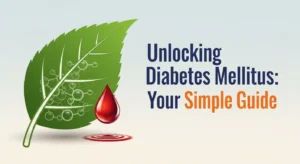Living with high blood sugar, also known as hyperglycemia, can be a tricky journey. Most people know about the common signs like feeling extra thirsty or needing to use the restroom often. But what if your body is trying to tell you something important in ways you don't expect? Hyperglycemia symptoms can show up with surprising that are often missed or mistaken for other issues.

Understanding these less common hyperglycemia symptoms is super important. Catching them early can make a big difference in managing your health and preventing serious problems down the road. This article will dive into the usual suspects and then reveal the hidden signs that might be a clue your blood sugar levels are too high. Get ready to learn what your body might be trying to tell you!
Key Takeaways
- Hyperglycemia isn't just about thirst: While common symptoms like increased thirst and frequent urination are well-known, high blood sugar can cause many surprising signs.
- Unusual skin and digestive issues: Dry, itchy skin, slow-healing sores, and unexpected stomach problems like nausea or bloating can be hidden hyperglycemia symptoms.
- Nerve and sensory changes: Tingling, numbness, dizziness, or even subtle changes in vision and hearing might point to prolonged high blood sugar affecting your nerves.
- Mood and mental clarity: High blood sugar can impact your brain, leading to irritability, anxiety, or difficulty thinking clearly.
- Early detection is key: Recognizing these surprising signs can help you seek medical advice sooner, leading to better management and preventing long-term health complications.
What is Hyperglycemia? (And Why Should You Care?)
Imagine your body as a car. Food is the fuel, and sugar (glucose) is the main type of fuel your cells use for energy. Insulin is like the key that unlocks the doors to your cells, letting the sugar in. When you have hyperglycemia, it means there's too much sugar in your blood. This happens because either your body isn't making enough insulin, or the insulin it makes isn't working properly (insulin resistance), or both.
Why should you care? Well, if your blood sugar stays high for too long, it can act like a slow poison, damaging many parts of your body over time. This can lead to serious health issues like:
- Heart disease
- Kidney problems
- Nerve damage (neuropathy)
- Eye damage (retinopathy)
- Foot problems
That's why knowing the signs, both common and surprising, is so vital. It's your body's way of sending an alarm!
The Usual Suspects: Common Hyperglycemia Symptoms
Let's start with the hyperglycemia symptoms that most people are familiar with. These are often the first clues that something isn't right with blood sugar levels.
- Increased Thirst (Polydipsia): Feeling thirsty all the time, no matter how much you drink. Your body tries to get rid of excess sugar by flushing it out, which makes you dehydrated.
- Frequent Urination (Polyuria): Because you're drinking more and your kidneys are working overtime to remove sugar, you'll find yourself needing to pee much more often, even at night.
- Increased Hunger (Polyphagia): Even though there's plenty of sugar in your blood, it can't get into your cells for energy. So, your body thinks it's starving and makes you feel hungry.
- Fatigue and Weakness: Without sugar getting into your cells for energy, you'll feel tired, sluggish, and generally weak, even after resting.
- Blurred Vision: High blood sugar can cause the lens of your eye to swell, leading to blurry vision that can come and go.
- Unexplained Weight Loss: Despite eating more, you might lose weight because your body is breaking down muscle and fat for energy since it can't use glucose properly.
These classic signs are important, but they're just the tip of the iceberg!

Surprise! Unexpected Hyperglycemia Symptoms
Now, let's talk about the hyperglycemia symptoms that often catch people off guard. These can be subtle, easy to dismiss, or seem unrelated to blood sugar. But paying attention to them can be a game-changer.
1. Skin Issues: More Than Just Dryness
High blood sugar can really take a toll on your skin.
- Dry, Itchy Skin: When your body loses fluids due to frequent urination, your skin can become very dry and itchy.
- Frequent Infections: High sugar levels in your blood can weaken your immune system. This makes you more prone to:
- Yeast infections: Especially in moist areas like the mouth (thrush), skin folds, or genital areas.
- Bacterial infections: Such as boils, carbuncles, or infections around hair follicles.
- Slow-Healing Sores or Cuts: High blood sugar can damage blood vessels and nerves, making it harder for blood to flow to wounds and for your body to heal itself. Even a small cut can take a long time to get better.
- Dark Patches of Skin (Acanthosis Nigricans): This often appears in the armpits, neck, or groin. It looks like velvety, dark patches and is a sign of insulin resistance.
2. Digestive Woes: When Your Stomach Acts Up
You might not think of your stomach when you think of blood sugar, but hyperglycemia can mess with your digestion.
- Nausea and Vomiting: While these can be signs of many things, persistent nausea and vomiting, especially when combined with stomach pain, can be a symptom of very high blood sugar, sometimes leading to a serious condition called diabetic ketoacidosis (DKA).
- Stomach Pain: General abdominal discomfort can occur.
- Gastroparesis (Slow Stomach Emptying): High blood sugar can damage the vagus nerve, which controls the movement of food through your digestive system. This can lead to:
- Feeling full very quickly after starting a meal.
- Bloating.
- Heartburn.
- Loss of appetite.
- Unexplained swings in blood sugar because food absorption becomes unpredictable.

3. Neurological Surprises: Nerves on Edge
Your nerves are highly sensitive to high sugar levels.
- Tingling or Numbness (Neuropathy): Often starting in the hands and feet, this “pins and needles” sensation or complete numbness is a classic sign of nerve damage caused by high blood sugar. It can feel like burning, aching, or sharp pain.
- Dizziness or Lightheadedness: High blood sugar can affect your body's fluid balance and blood pressure regulation, leading to feelings of dizziness, especially when standing up quickly.
- Confusion or Difficulty Concentrating: Your brain needs a steady supply of sugar, but too much or too little can impair its function. You might feel “foggy,” have trouble focusing, or forget things easily.
- Mood Changes: Irritability, anxiety, sadness, or even depression can be linked to unstable blood sugar levels. These mood swings can be frustrating and confusing.
4. Oral Health: Your Mouth's Hidden Clues
Your mouth is a window to your overall health, and high blood sugar can impact it significantly.
- Dry Mouth: Similar to general dehydration, high blood sugar can reduce saliva production, leading to a persistently dry mouth. This isn't just uncomfortable; it also increases your risk of other problems.
- Gum Disease (Gingivitis/Periodontitis): High blood sugar makes you more vulnerable to infections, including those in your gums. Gums might become red, swollen, bleed easily, and eventually lead to tooth loss if not treated.
- Increased Cavities: Less saliva means less protection against acids, making your teeth more prone to decay.
5. Vision Changes (Beyond Just Blurry)
While blurred vision is common, high blood sugar can cause other, less expected eye issues.
- Sudden Changes in Prescription: Your vision might fluctuate, requiring frequent changes in your eyeglasses prescription. This is due to swelling in the eye's lens.
- Floaters or Flashes of Light: These can be signs of more serious eye damage, like diabetic retinopathy, where blood vessels in the retina are affected.
6. Hearing Loss: A Silent Symptom
This is one of the more surprising hyperglycemia symptoms. Research suggests a link between high blood sugar and hearing loss. High glucose levels can damage the tiny blood vessels and nerves in your inner ear, which are crucial for hearing. If you notice a gradual decline in your hearing, especially in noisy environments, it's worth discussing with your doctor, alongside checking your blood sugar.
7. Sexual Dysfunction: An Uncomfortable Truth
High blood sugar can affect blood flow and nerve function throughout the body, including those important for sexual health.
- Erectile Dysfunction (ED) in Men: Difficulty achieving or maintaining an erection is common in men with uncontrolled diabetes due to nerve and blood vessel damage.
- Vaginal Dryness in Women: High blood sugar can affect lubrication and sensation, leading to discomfort during intercourse.
Why Do These Surprising Symptoms Happen?
It all comes back to how high blood sugar affects your body at a fundamental level. Think of it this way:
- Blood Vessel Damage: High sugar levels can stiffen and narrow your blood vessels. This means less oxygen and nutrients get to your organs, nerves, and skin. Poor circulation leads to slow healing, nerve damage (neuropathy), and issues with organs like the heart, kidneys, and eyes.
- Nerve Damage (Neuropathy): As mentioned, nerves are very sensitive. High blood sugar can directly damage the delicate nerve fibers throughout your body. This can lead to tingling, numbness, pain, and problems with involuntary functions like digestion, blood pressure, and sexual response.
- Weakened Immune System: High sugar levels can impair the function of your white blood cells, which are your body's defenders against infection. This makes you more vulnerable to bacterial and yeast infections, and makes it harder for wounds to heal.
- Dehydration and Fluid Shifts: The body tries to get rid of excess sugar through urine, pulling water with it. This leads to dehydration, which affects everything from your skin to your brain function and blood pressure.
“Your body is a complex system, and high blood sugar impacts nearly every part of it, often in ways you wouldn't expect.”

When to See a Doctor
Recognizing these hyperglycemia symptoms is the first step. The next is knowing when to get professional help.
You should contact your doctor if you experience:
- Any of the common or surprising symptoms persistently.
- Blood sugar readings that are consistently high (e.g., above 180 mg/dL or 10 mmol/L, or as advised by your doctor).
- Blurred vision that doesn't go away.
- Numbness, tingling, or pain in your hands or feet.
- Sores or infections that don't heal.
Seek immediate medical attention (call 911 or go to the nearest emergency room) if you have signs of Diabetic Ketoacidosis (DKA) or Hyperosmolar Hyperglycemic State (HHS), which are medical emergencies:
- DKA symptoms: Severe nausea and vomiting, stomach pain, deep rapid breathing (Kussmaul breathing), fruity-smelling breath, confusion, weakness.
- HHS symptoms: Very high blood sugar (often over 600 mg/dL or 33 mmol/L), extreme thirst, fever, confusion, hallucinations, seizures.
Managing Hyperglycemia: What You Can Do
The good news is that hyperglycemia symptoms can often be managed and even reversed with proper care. Here's what you can do:
- Follow Your Treatment Plan: If you've been diagnosed with diabetes, it's crucial to take your medications (insulin or other diabetes drugs) exactly as prescribed. Don't skip doses!
- Healthy Eating: What you eat has a direct impact on your blood sugar.
- Focus on whole foods: Lots of vegetables, lean proteins, and whole grains.
- Limit sugary drinks and processed foods: These cause rapid blood sugar spikes.
- Portion control: Even healthy foods need to be eaten in moderation.
- Learning about how different foods affect your body can be empowering. For some, exploring specific dietary approaches or even looking into Liv Pure reviews might offer insights into supporting liver health and metabolism, which can impact blood sugar.
- Regular Physical Activity: Exercise helps your body use insulin more effectively and lowers blood sugar. Aim for at least 30 minutes of moderate activity most days of the week. This could be brisk walking, swimming, or cycling.
- Monitor Your Blood Sugar: Regularly checking your blood sugar levels helps you understand how food, exercise, and medication affect you. This allows you to make adjustments and keep your levels in a healthy range.
- Manage Stress: Stress hormones can raise blood sugar. Find healthy ways to cope, such as meditation, yoga, deep breathing exercises, or spending time in nature.
- Stay Hydrated: Drink plenty of water throughout the day.
- Get Enough Sleep: Poor sleep can affect insulin sensitivity and blood sugar levels. Aim for 7-9 hours of quality sleep per night.
- Regular Check-ups: See your doctor regularly for check-ups, blood tests, and to review your treatment plan. They can help you manage your condition and catch any problems early.
For those interested in comprehensive health strategies, managing weight is often a key component. Some people explore options like a 3-day fast for weight loss as part of a broader health strategy, though this should always be done under medical guidance.
Furthermore, overall health encompasses many aspects. For men, paying attention to specific areas like prostate health is also crucial. Understanding your options with a guide to prostate supplements can empower you to make informed decisions. You might also want to research the most effective prostate supplements reviewed for 2025 or learn how products like Prostavive are designed to help with prostate issues. While not directly related to hyperglycemia symptoms, maintaining holistic health contributes to better blood sugar management and overall well-being.

Living with Hyperglycemia: A Daily Plan
Managing hyperglycemia is not a one-time fix; it's a daily commitment. But it doesn't have to be overwhelming.
- Consistency is Key: Stick to your meal times, medication schedule, and exercise routine as much as possible.
- Educate Yourself: The more you know about your condition, the better equipped you'll be to manage it.
- Build a Support System: Talk to family, friends, or a support group. You don't have to go through this alone.
- Work with Your Healthcare Team: Your doctor, dietitian, and diabetes educator are your partners in health. Use their expertise!
Remember, every small step you take towards better management adds up to big health benefits. Don't get discouraged by setbacks; simply get back on track.

Conclusion
Hyperglycemia isn't always obvious. While the common hyperglycemia symptoms like thirst and fatigue are well-known, it's the surprising ones – the skin issues, digestive problems, nerve sensations, and even changes in your mood or hearing – that often go unnoticed. Being aware of these less common signs can make a world of difference in catching high blood sugar early and preventing long-term complications.
If you notice any of these symptoms, especially if they are persistent or occur together, don't hesitate to speak with your doctor. Early diagnosis and consistent management are your best tools for living a healthy, full life with or at risk of diabetes. Your body is always communicating; it's up to us to listen to all its signals, even the surprising ones. Stay informed, stay proactive, and stay healthy!








